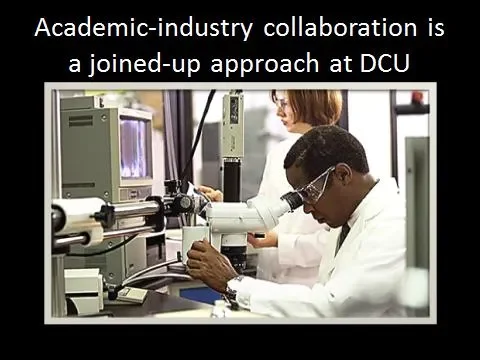
A joined-up approach to academic-industry collaboration
LIFE SCIENCES Academic and research institutions are increasingly collaborating with industry say senior staff at Dublin City University (DCU) — but the trick is doing so effectively.
“Researchers rarely work in isolation these days."
Many of their graduates have gone on to become senior managers in biotech and pharma companies in Ireland. Yet fostering effective collaboration between academic organisations and enterprise isn't a simple process. To do it well, you first need to create an ecosystem that allows mutually beneficial relationships to flourish.
To engage more effectively with industry the university set up DCU Invent as a commercialisation company to support and encourage the translation of innovative research, inspired where possible, by industrial partners. Invent is staffed by a team of experienced business development managers who complement the research expertise of the researchers and who talk the language of business.
Innovation
Invent also houses an incubation centre offering laboratory and office facilities for start-ups; and, more recently, it opened a new innovation campus (DCU Alpha) where more established businesses can locate innovation arms and easily tap into research expertise. “We find that, particularly in the pharma and biotechnology sectors, companies want to be close to the university's researchers and resources,” says Stokes. “For example, a specialty pharma start-up Sigmoid Biopharma based in our Invent Centre has now expanded into our new Nanobioanalytical Research Facility (NRF).

Expertise
Professor Christine Loscher, Director, Health Technologies Research & Enterprise Hub at DCU, says that any innovative company that wants to grow and develop can benefit hugely from embedding itself in a research environment. She also points out that, for this to happen at all, efficient operational organisation is critical. “One of the challenges facing companies that want to work closely with a university is accessibility,” she says. “They want to know: 'Where do we go and who do we contact?' Our answer was to set up central units called Research and Enterprise Hubs in areas which reflect both the expertise at DCU but also those of strategic importance to the university, these Hubs, along with Invent, act as points of contact for any company that is interested in working with us.
The university has also developed a connected infrastructure network, which includes research centres such as its National Institute for Cellular Biotechnology (NICB) and the Nanobioanalytical Research Facility (NRF), along with a number of others. “We've organised these into core facilities with centrally managed access, fully supported by an experienced technical team,” says Loscher. “This means we can either do the research work for a company — or they can do it here themselves with their own people, or they can locate some of their activities on campus in a space that has been specifically allocated to them."
"It's a 'joined up' approach that is working very well for us."
Companies can avail of the breadth of expertise necessary for their business in one place, such as cell engineering, advanced analytics and protein characterisation.”

Describing the long history of interaction that the NICB has with the Biopharmaceutical industry in Ireland Dr. Niall Barron the Director of NICB explained ‘We have worked with many of the big multinationals to help them increase the efficiency of the cell lines they use to produce modern Biotherapeutics. We apply techniques such as transcriptomics and proteomics to understand the genetics of these valuable cell lines and then use advanced gene engineering techniques to improve Biopharmaceutical production by these cells.’ This expertise will also form part of an ambitious proposal led by the National Institute for Bioprocessing Research and Training (NIBRT) to create a new SFI Centre focused on addressing the challenges faced by the Biopharma industry. “This center-of-excellence proposes to bring together experts from most of the universities and is supported by 27 industrial partners. The ambition is that not only will this initiative demonstrate Ireland’s strong commitment to supporting, strengthening and embedding the Biomanufacturing industry here, but to also send a strong message globally as to the importance we place on the continued success of the industry in Ireland. Hopefully that will have a positive impact on future FDI in this area”.
Investment
However, Loscher warns that it's not that we want to be simply 'a service provider' to industry. “Rather, we want to work with companies to solve their problems, but also use our relationship with them to better understand the big challenges that they will be facing in the future,” she says “That way DCU can develop research programmes that will be really important to them in the long-term. And companies are getting the message that while the research they want done in the short term is important, there is also a need for investment in fundamental research in order to give them a competitive edge in the longer term.”
LEARN MORE:
Invent is DCU's Innovation and Enterprise Centre. Our mission is to connect industry with DCU researchers to promote innovation, knowledge transfer and commercialisation of DCU innovations through licensing and start-ups. The Business Development team provide the critical link between the university and business and help entrepreneurs to identify suitable translational research, consultancy, expertise and contract research opportunities. Should you wish to engage with DCU, the team at Invent will facilitate this. We have extensive experience in leveraging state-funded schemes that support industry-academic collaborations to provide solutions to your technical and clinical unmet needs.
Contact us: info@invent.dcu.ie
Twitter: @InventDCU
www.invent.dcu.ie
Article - Media Planet Business News Ireland
